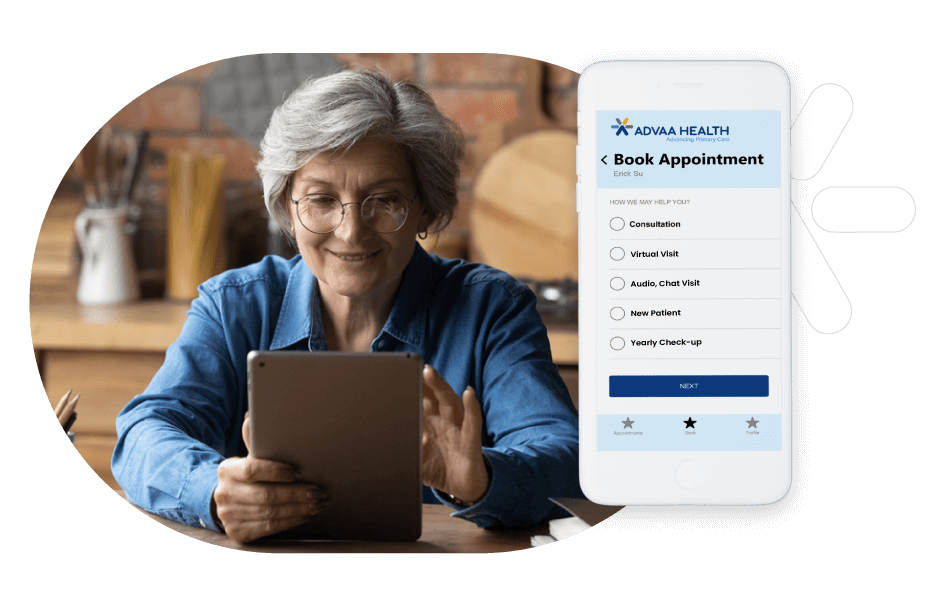Home » Remote Patient Monitoring
Remote Patient Monitoring Software for Continuous, Reimbursable Care
Track patient vitals in real time and deliver proactive, Medicare-aligned care with Advaa Health’s Remote Patient Monitoring (RPM) software

Empower Your Practice with an Advanced RPM Platform
Advaa Health’s Remote Patient Monitoring platform turns patient vitals into actionable clinical insights—helping care teams intervene earlier, reduce avoidable hospital visits, and improve outcomes between office visits.

What is Remote Patient Monitoring?
Remote Patient Monitoring (RPM) uses connected, FDA-cleared devices to track patient health outside the clinic. For healthcare practices, RPM bridges the gap between office visits by providing continuous insights that help identify issues early and reduce hospitalizations.
RPM is particularly effective for:
- Chronic conditions like diabetes, CHF, or COPD
- Recovery from acute events or procedures
- High-risk health profiles requiring close observation
How Remote Patient Monitoring Enhances Chronic Care Management (CCM)
Advaa Health’s RPM software complements Chronic Care Management (CCM) programs by improving care coordination and patient engagement. Together, RPM and CCM enable practices to deliver continuous care while maximizing operational and financial efficiency.
Smart Device Deployment
Same Day shipping of HIPAA-compliant remote patient monitoring devices including:
- Blood pressure monitors
- Bluetooth glucometers
- Pulse oximeters
- Smart scales
White-glove setup:
- Patient training videos
- 24/7 tech support
Continuous Data Intelligence
With 16+ days of monitoring per month—exceeding CMS minimum requirements—our Remote Patient Monitoring platform generates real-time alerts for:
- Hypertensive crises (>180/120 mmHg)
- Hypoglycemic events (<70 mg/dL)
- Oxygen desaturation (<88%)
Guided Clinical Response
Our RPM software supports structured clinical workflows that enable timely, documented interventions.
- Medication reviews
- Care plan adjustments
- Preventive guidance
Escalation pathways for:
- Telehealth intervention
- Emergency care avoidance
- Digital patient consent workflows
- Detailed data logs and summaries
- Monthly patient engagement and compliance reporting
Eligibility & Enrollment
- Medicare Part B beneficiaries
- 2+ chronic conditions (e.g., diabetes, CHF, COPD)
- At significant risk of: Acute exacerbation, Functional decline, Hospitalization
Practice Requirements
- Provider-led care team
- EHR with care plan functionality
- 24/7 patient access (direct or contracted)
Key Financial Benefits
Reimbursement and revenue potential may vary based on payer, patient eligibility, and care delivery model.
-
$120+/month revenue per
patient (device + monitoring) -
$0 cost to patients with
Medicare Part B -
92% first-claim
acceptance rate
- $120+/month revenue per patient (device + monitoring)
- $0 cost to patients with Medicare Part B
- 92% first-claim acceptance rate

Advaa Health Differentiators
- Complete remote patient monitoring ecosystem
- Inventory management
- Lost/damaged device replacement
- RN- and care manager-led data triage
- Standing order templates
- Automated code stacking (RPM + CCM + BHI)
- Denial resolution guarantee
Performance Metrics
45%
Reduction in 30-day readmissions
86%
Patient adherence rate
21 days
average practice ROI
Implementation

Frequently Asked Questions
Remote Patient Monitoring is a digital health service that uses connected devices to collect and transmit patient health data—such as blood pressure, glucose, or oxygen levels—to care teams in real time, enabling earlier interventions and better chronic disease management.
Patients with chronic conditions like diabetes, hypertension, COPD, or heart failure, as well as those recovering from surgery or managing high-risk health conditions, benefit from RPM through closer monitoring and timely clinical support.
Advaa Health provides patients with user-friendly, Bluetooth-enabled devices that transmit health data directly to their care team. Our platform helps providers track trends, receive alerts, and respond with timely interventions—without requiring in-person visits.
No. All RPM devices are pre-configured and shipped ready-to-use. We provide simple training videos and 24/7 technical support to ensure patients and caregivers feel confident using the equipment from day one.
Medicare reimburses Remote Patient Monitoring services when eligibility, documentation, and care delivery requirements are met. Advaa Health’s RPM platform is designed to support compliant, Medicare-aligned RPM workflows.





